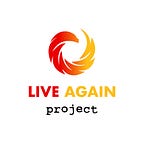My Live Again Story: Gizelle and Isaak
Here is Gizelle (age 90) and Isaak (92). Gizelle is lung cancer stage 3B survivor and Isaak is her husband. This is their Live Again Story:
Gizelle and Isaak were both concentration camp survivors, Gizelle from Auschwitz and Isaak released in Buchenwald. Isaak recalls, “ I was in a lot of camps. I ended up, I was liberated in Buchenwald on April 14th 1945. I was incarcerated April 15th 1941, and I was in many camps. I was almost dead several times, and a lot of events happened that would be too hard to describe. What contributed to my survival, whatever it is, but I guess it had to with it being young — probably is the most, the basic ingredient of what I can understand what helped me to survive, and I never dwelt on it.”
When Gizelle was first diagnosed with lung cancer, her doctors gave her 2 years. She said she was in denial first, but nothing could defeat her strength as she had dealt with much worse during concentration camp. She said, “I’m either going to die or I’m going to live. I’m going to live.” How, I asked. “I’ll take one day at a time.” Isaak explains she stays positive because she doesn’t give too much meaning to things in life. “I believe she doesn’t complicate life. In her life she’s here, she does her best she can, she enjoys it, and she goes on and she does her best — that’s it. I believe in this. I have seen it — sometimes even irritating to me because I can come out about a subject, philosophizing about it, trying to understand the economics or politics, I don’t care, she’s interested in her life, her family, she takes care of it and that’s it.”
Gizelle gives another example of a cancer patient she saw frequently at support group. “Actually, one of them was a writer, yes. Lovely, lovely lady, and I really enjoyed talking to her. She enjoyed listening. And to everybody else, not only me, you know? But she was so adamant about finishing that book she was writing. And every week we see her, and we saw her again and it’s, “oh my gosh, I did some more writing,” “How wonderful, are you going to finish the book?” This is such a great example of continuing to have love, pleasure, and purpose as writing meant so much to this lady. Writing became a form of catharsis and stress relief.
Very similar to this support group member, Gizelle had a strong desire to go back into the work force very shortly after receiving chemotherapy. She worked in real estate. “A client of mine called me up. A lot of people, when they find out you have cancer — terminally ill, they don’t know how to react and I found myself. I had to put them at ease instead of they putting me at ease because they were not at ease at all. They didn’t know what to say, what to do. That’s very normal, by the way.”
Interesting how different people who have cancer want to be treated. Gizelle explains, “Everybody’s a little bit different but I hear over and over again that you don’t want to be recognised as somebody, you know, has cancer necessarily. You wanted to be treated the same, acknowledged that you have cancer, but treated the same.” So she just kept working. “That’s how I kept going. I took the listing, it was in Santa Monica. In the meantime, she had a 3-bedroom condo — a townhouse basically in Santa Monica and she said, “okay, it’s too big for me” she’s a single lady — “too big for me,”“Let’s get a condo — a smaller condo.” And I went out, we looked around, I found her a condo in Westwood. 1-bedroom condo — that’s all she needed.”
Isaak mentions he lives each day with purpose. “And I think what we’re doing now is for mankind. Your philosophy has always been the same, too. You were mentioning, you know, you don’t live for yourself, you’re living for your family. For mankind. But basically, you look at the world around you — what can I do? How can I improve this? How can I do something to help people? Say a kind word. I know she is doing it.”
With Gizelle and Isaak, they were fortunate to have been through the unimaginable experience in the Jewish concentration camps to give them the mental toughness in dealing with cancer. For them, it was important to have purpose: to live for something greater than yourself — like your family — and humanity. I was also important for them to just remember doing the things they enjoy doing and spending time with the people they love most; fortunately they still get to do this after 61 years.
